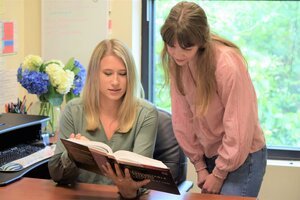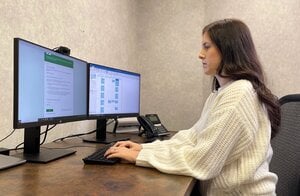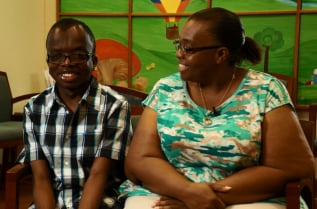With a nationwide shortage of clinical geneticists and genetic counselors, clinics must get creative to manage the demand for genetic services and avoid long wait times for appointments. One way that GGC and other genetics organizations are addressing this workforce shortage is through the addition of a new professional – the genetic assistant.
Genetic assistants (GAs) typically have a bachelor’s degree in a health-related or scientific field and support geneticists and genetic counselors by managing administrative tasks in the clinic setting. They assist with referrals, scheduling, sample coordination, and billing activities associated with patient visits. GGC currently employs four genetic assistants, one each in the Center’s Greenwood and Greenville locations and two in the Charleston office.

Alli Davis joined GGC’s Charleston office in 2021 as a genetic assistant in the metabolic clinic where she assists with tasks such as scheduling, coordinating testing, requesting insurance authorizations, and creating genetic lectures.
“One of the things I love most about being a GA is having the opportunity to directly impact a patient and their family’s experience with GGC,” shared Davis. “I have had the pleasure of meeting many unique and wonderful patients and families during my time at GGC!”
In metabolic clinics, many of the patients are followed and treated long term, which is something Davis enjoys about her role. “It is wonderful to watch the patients grow and thrive throughout the years we see them.”
GAs at GGC have also become involved in implementing workflows for eConsults and eVisits.
“GGC was awarded a grant from The Duke Endowment to develop a program to improve access to genetic services by having GGC providers communicate asynchronously with non-genetics providers (eConsults) and with our patients (eVisits),” said Mike Lyons, MD, GGC’s Director of Clinical Services. “Part of that grant specifically covered the addition of genetic assistants. Our GA in Greenwood, Mattie Piotrowski, has been a critical part of the development of this innovative approach to genetics care.”

Piotrowski has helped to create the workflows for eVisits, which are offered to patients who are due for a follow-up appointment.
“eVisits allow the patient to connect with their provider through a secure online platform at their convenience,” said Piotrowski “They can check in, get their questions answered, and if recommended, we can even coordinate additional genetic testing through this platform.”
One of Piotrowski’s main roles has been to educate patients on the availability and benefits of eVisits.
“Once I explain how eVisits work and the convenience of not having to travel or wait for an appointment, we have had many follow-up patients complete eVisits with great success,” Piotrowski explained. “This also opens up appointments for new patients or those who prefer or need in-person care, reducing their wait times.”
With the growing impact of GAs on GGC’s patient care, GGC’s Division of Education has partnered with Lander University’s School of Nursing to develop a Genetic Health Studies certificate program to prepare students to work as a GA in a genetics clinic.
Holisa Wharton, PhD, Dean of the William Preston Turner School of Nursing at Lander and a member of GGC’s Board of Directors, worked closely with Leta Tribble, PhD, GGC’s Director of Education to develop the curriculum.
“The certificate program at Lander is co-taught by Lander nursing faculty and GGC faculty. The five course sequence covers topics such as pedigree construction and analysis, laboratory testing, and genetic treatments,” said Tribble. “Students also have the opportunity to complete a rotation at GGC to observe in clinics and practice skills to assist with patient care.”
“The skills and experience that GAs acquire in patient care settings also makes them well suited to advance their education in genetic medicine,” added Tribble. “Several previous GAs at GGC have moved on to graduate programs in genetics or genetic counseling.”
Davis and Piotrowski both became genetic assistants to gain exposure to clinical genetics with plans to pursue careers as genetic counselors.
“One of the biggest reasons why I chose to become a part of the GGC family was their commitment to promote compassion and care for patients and their families,” added Davis.
